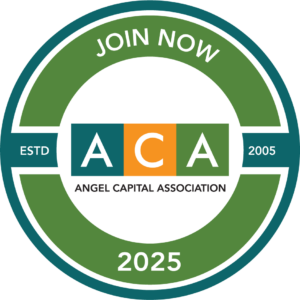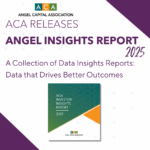Angel Insights Blog

Wednesday, June 23, 2021
Beware the Tax Consequences of the Convertible Note
By: Kevin Learned, Partner of Sage Growth Capital
The pros and cons of convertible notes have been thoroughly documented. However, the tax consequences of a convertible note have not been explored in as much depth. This blog post is an attempt to document the adverse tax effects that have surprised some investors.
Convertible notes are a popular instrument for raising early-stage capital. For a comprehensive discussion of convertible notes, see Angel Capital Association’s former Chair Emeritus John Huston’s excellent paper on this subject: here. A convertible note documents a loan to a company by the investors. Typically, the note accrues interest but does not pay the interest until maturity or conversion (in which case the interest is converted along with the principal). The note is convertible into the next round of stock at the time that stock is issued, usually at a discount from the price of the note. Often sophisticated investors will insist on a maximum valuation for the conversion, or a “cap.” In this case the note converts at the lesser of the cap or the discounted price.
A Convertible Note is not Stock
Angel investors are provided two potentially valuable tax benefits in certain cases. For the holders of “Qualified Small Business Stock,” IRS Section 1202 provides an exemption from paying taxes on a gain. Section 1244 allows the investor to write off the investment as an ordinary business loss rather than a capital loss. We have explored these benefits in depth in an Angel Capital Association webinar (Tax Tips for Angels that Really Matter, October 3, 2018, accessible here) and our intention here is not to restate the qualifications except for one: the investor must hold stock to qualify for the benefits. A convertible note is not stock, and a note holder does not qualify. Further, section 1202 has a five-year holding period. For a convertible note purchaser, that clock does not start until the note is converted.
Interest on a Convertible Note is Taxable Income
The law is clear, but practice is inconsistent, sometimes leading to surprises.
What Does the Law Say?
Under IRS Section 1273(a), the annual interest accrual may be treated as “original issue discount” or “OID.” The company is obligated to compute the accrued interest each year and issue a 1099 OID to the investors. A cash basis taxpayer will generally not claim the interest as income until the interest is actually paid out or converted to stock. However, IRS Section 1272 requires reporting regardless of the taxpayer’s accounting method (cash or accrual basis). In other words, a taxpayer should calculate and report the interest even if a 1099 OID is not issued by the company. If the company does issue the 1099 OID, the IRS will seek to match the 1099 OID to the taxpayer’s return. To avoid triggering an audit, the taxpayer should report the 1099 OID on its return.
If you are an individual investor, this is not a problem as you were already going to file a tax return. But, if you are a syndicate, this means the syndicate must file a partnership return and distribute zero income K-1s to its members. And, of course, it costs money to file a tax return. This is especially aggravating if the note is held over multiple years as the syndicate will need to file a tax return each year, even though it receives no cash from the company.
Here’s the practice
1. A 1099 OID is usually a surprise. Most convertible note issuers do not issue a 1099 OID. Instead, they wait and issue a 1099 INT reporting the total interest income accrued on the note at the time of conversion. Since most investors expect this practice, they may well be surprised if a 1099 OID suddenly arrives before the note converts. One of the syndicates Loon Creek services had this happen. Worse, the 1099 OID did not arrive until May 1, well past the March 15 deadline for filing a partnership tax return. This meant the syndicate had to file a late partnership tax return. And of course, it had to issue K-1s to the investors after many had already filed their personal returns.
The IRS added to the fun by sending a bill for late filing. While our accounting firm was able to get the penalty reversed, the syndicate did incur professional fees to prepare the return, and to negotiate the reversal of the penalty, resulting in a capital call no one wanted.
2. Not all companies will issue a 1099 INT at conversion. When your interest-bearing convertible note converts, you have constructive receipt of the accrued interest, even though it was paid in stock, not cash. You are obligated to report that income, even if the company fails to provide you with a 1099 INT. For our syndicates, if the company does not issue a 1099 INT, Loon Creek will attempt to determine the interest being converted from the conversion documents and have a partnership tax return filed to pass this income through to the members of the syndicate.
The rub comes when the company subsequently issues a late 1099 INT that does not agree with the interest reported on the partnership return. If it’s material, we may have to file an amended return and all that this entails.
So, What to Do?
1. Plan on tax returns. If you purchase a convertible note, you are going to file one or more tax returns. At Loon Creek, we encourage our investors to add cash to their initial capital call to assure liquidity to pay for tax return preparation. That cash is an asset of the syndicate and is returned if not needed.
2. Ask the company its plans. Most entrepreneurs are not tax experts, and how they will treat accrued interest is the furthest thing from their minds when raising capital. But if they are selling a convertible note, discuss with them before purchasing whether they will be issuing a 1099 OID, or a 1099 INT. Get a commitment from them that these documents will be issued timely (i.e., January 31). If the entrepreneur says, “I don’t know” or worse, “I’m not going to issue 1099s”, beware. You may be headed for a tax mess.
3. Demand a 1099 at conversion. Assuming the company doesn’t regularly issue 1099 OIDs, make sure you and the company agree upon the amount of the accrued interest being converted, and gain a commitment from the company that they will issue a 1099 INT on a timely basis. It doesn’t hurt to remind the company of this obligation about January 10th in the year following conversion
4. Talk to your accountant. Consult your accountant before you make the investment and be sure both you and the accountant understand the possible consequences of your investment. Upon conversion, make sure your accountant knows about the amount of interest converted. That way, in the event you do not receive a 1099 INT, you can be protected by reporting the interest income anyway. And, of course, you want to increase your basis in the stock by the amount of interest converted.
5. Non-interest-bearing notes don’t work. Of course, you could purchase a note that does not bear interest. But this does not solve the problem. The IRS says if there’s no stated interest, then you have in fact purchased a discounted note and must report original issue discount.
6. What about SAFEs and KISSs? If the instrument you are purchasing is not a debt of the company and does not accrue interest as is true with many (but not all) SAFEs and KISSs, then you are relieved of this entire interest accrual and reporting issue. In Loon Creek’s opinion, this may be one of the few good things about these instruments. However, avoiding the interest accrual and reporting issues may not outweigh governance and voting rights concerns associated with these instruments.
7. Convert immediately. Some notes have the right to convert at any time, not just at the next qualified financing. If this is the case, you may want to convert immediately upon purchasing, assuming you can secure the discount. While you’ll give up your rights as a creditor, it may be worth it to gain shareholder rights, avoid interest income, and start the IRS section 1202 clock running.
8. Avoid purchasing convertible notes. Some investors, Loon Creek’s principals among them, only invest in equity rounds to avoid these issues.
Clearly this is a complex topic. We’ve tried to make it simple and accurate, but the devil is always in the details. We’re not tax advisors, so please don’t rely upon this post as the final authority. As always, consult tax and legal counsel before making the investment decision or subsequent decisions regarding reporting interest income.
Loon Creek specializes in syndicate formation and management services for private investors (and for the companies in which they invest).
This article was originally published here.
About Loon Creek Capital Group, LLC – specializes in streamlined group investing services. Our company was formed in 2010 to address the needs of our local angel community and has grown to provide services to angel investors across the U.S. As active angel investors ourselves, we understand the challenges of investing in early stage companies. We are committed to helping investors deploy their capital efficiently.
Tags: Angel investing






